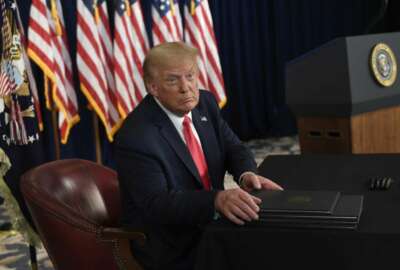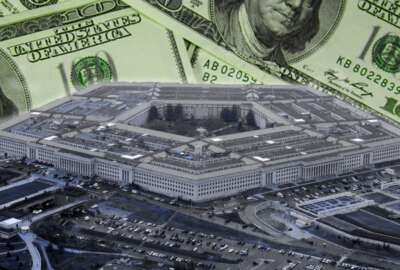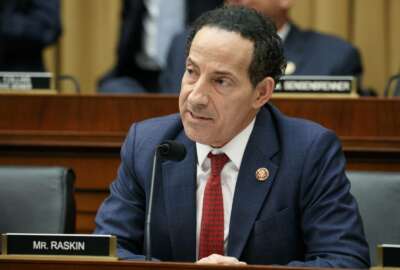
Vague OMB guidance on payroll tax deferral leaves many questions unanswered
The Office of Management and Budget has at last issued written guidance on the president's upcoming payroll tax deferral for federal employees and military members.
The Office of Management and Budget has, at last, offered up more information on the president’s payroll tax deferral, which the Trump administration will implement for most federal employees and military members later this month.
But the guidance is brief, vague and leaves many questions unanswered.
“Executive branch agencies are to implement the deferral for the next pay period for executive branch employees, to the maximum extent feasible,” Michael Rigas, OMB’s acting deputy director for management, wrote Friday in a memo to agencies. “To effectively and efficiently implement the deferral, and to provide the intended immediate financial relief, agencies shall implement the deferral to all employees in the following manner.”
Federal employees will not have an opportunity to opt out.
The memo goes on to instruct agencies to implement the payroll tax deferral for all eligible employees.
It then directs agencies to “continue to inform and educate employees concerning the payroll tax deferral, including its anticipated impact on individuals’ paychecks over the course of the coming months.”
Rigas recommended each agency coordinate with their own payroll providers to answer employee questions and disseminate information.
“The President and the Administration continue to advocate for Congressional action to make the payroll tax deferral permanent,” he wrote. “In the meantime, we appreciate you making every effort to implement the deferral for all eligible employees, and to ensure that your employees are educated and aware of the particular effect on their own personal finances.”
Though the OMB is light on the specifics, some agencies and their payroll providers were beginning to provide more details to their customers as of Friday afternoon.
The Interior Business Center, for example, told customers it was implementing the payroll tax deferral for the current pay period that ends Sept. 12.
IBC employees will see the “savings” in their upcoming paychecks scheduled for Sept. 18 or Sept. 22 depending on their agency’s pay calendar.
The Interior Department said employees will see the deferral in their Sept. 22 paycheck. It will continue through to the final paycheck of the year on Dec. 24 or 29.
The Defense Finance and Accounting Service (DFAS) told active-duty military members the payroll tax deferral will be in place for their Sept. 15 paycheck.
The OMB memo also does not explicitly inform federal employees of their obligation to pay the deferred taxes back starting next January through April, as the IRS and the military’s largest payroll provider have explained in its own guidance for employers and frequently-asked-questions.
It does not detail how exactly employees or military members will be expected to pay back deferred taxes next year — or how employees who leave federal service before next January will be expected to pay those taxes back, either.
As Federal News Network has previously reported, a memo from the Coast Guard to its military and civilian workforce said those who leave federal or military service before 2020 ends will have deferred taxes taken out of their final paychecks.
DFAS FAQs posted earlier this week suggest employees would pay deferred taxes over the course of several paychecks, from January through April 2021.
And the very least, the OMB memo doesn’t explain who specifically is eligible for the payroll tax deferral. Civilian federal employees whose gross, biweekly wages are $4,000 or less will have the 6.2% Social Security tax deferred from their paychecks.
For military members, the payroll tax deferral applies to anyone who makes $8,666 a month or less.
On Thursday evening, President Donald Trump suggested he would forgive employees’ deferred payroll taxes if elected to a second term.
When we win I, as your President, will totally forgive ALL deferred payroll taxes with money from the General Fund. I will ALWAYS protect Seniors and your Social Security! Sleepy Joe Biden will do the opposite, he will raise your taxes and DESTROY our Country!
— Donald J. Trump (@realDonaldTrump) September 11, 2020
The president does not have the power to forgive employees’ or military members’ deferred taxes. Only Congress has the authority to make changes to the tax code, and there is no guarantee Congress, as the OMB memo suggests, will vote to make the payroll tax deferral permanent.
Knowing this, military officials have been urging servicemembers to hang on to the “savings” they see in upcoming paychecks from the payroll tax deferral in preparation for higher tax bills next year.
The lack of information about the president’s payroll tax deferral for civilian employees and military members has infuriated federal unions and members of Congress, who have written to OMB on multiple occasions within the last week seeking more details.
House Democrats and a bipartisan group of senators have all asked OMB to provide federal employees with the opportunity to opt-out of the payroll tax deferral.
Copyright © 2025 Federal News Network. All rights reserved. This website is not intended for users located within the European Economic Area.
Nicole Ogrysko is a reporter for Federal News Network focusing on the federal workforce and federal pay and benefits.
Follow @nogryskoWFED






